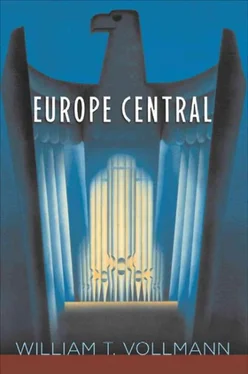11
Most literary critics agree that fiction cannot be reduced to mere falsehood. Well-crafted protagonists come to life, pornography causes orgasms, and the pretense that life is what we want it to be may conceivably bring about the desired condition. Hence religious parables, socialist realism, Nazi propaganda. And if this story likewise crawls with reactionary supernaturalism, that might be because its author longs to see letters scuttling across ceilings, cautiously beginning to reify themselves into angels. For if they could only do that, then why not us?
A kindred longing for autonomy doubtless animated the prisoner when in her low and leaden voice she whispered: Nadezhda Konstantinovna, have you ever read the Kabbalah?
I haven’t time for that trash. Say what you like…
It’s written that man is the moving hand, and God is the shadow. Only man can save God. And now you and Lenin are the two gods of Russia. Don’t deny it, Nadezhda Konstantinovna! You yourself are God . 8 8 Literally, SHEKHINAH, the female aspect of Jehovah.
And only I can save you. Only I can repair your glory.
Krupskaya half rose, staring at her in astonishment.—So that’s the kind you are, she said. You’re not even intelligent.
Not at all. But at least I am real. I tried to kill Lenin because he wanted to be God, but now that he’s achieved his aim he’s become my shadow, so I must worship him. And you, too, with your tremors, your isolation and your silliness, you’re my shadow, too! If it weren’t for me, you wouldn’t be here…
You should be in an asylum. I’m leaving.
I seek hidden worlds, the woman said into Krupskaya’s staring, steadfast face. And then, in a very low voice (since Stalin was undoubtedly listening behind the wall), she whispered: Are you true to yourself?
I beg your pardon! Why should I answer to you, murderess?
I don’t ask for justifications, Nadezhda Konstantinovna. I ask only for your pity.
Krupskaya’s heart was pounding. Rubbing her forehead, rapidly gasping, she wondered when a stroke would finish her off.
Will you pity me? the woman was demanding.
I—
Look at me. Look at where I am. Will you pity me?
Krupskaya wanted to weep, but dared not. Clearing her throat, she haltingly said: I remember when I was in prison and I felt so passionately that armed struggle was necessary. And I—I think that you, too, must feel passionately.
The woman’s face swelled then with a dull ecstasy, and she knelt before Krupskaya on the flagstones of the cell, flinging back her head, offering her throat, so that in her shape she resembled the letter Beth, which means both wisdom and madness.
But you’re deranged! You need a doctor. I’ll tell Ilyich…
Don’t trouble yourself, Nadezhda Konstantinovna—
Then Krupskaya began to tremble, and she said: You’re not Fanya Kaplan, are you?
If I’m not who I say I am, draw your own conclusions—
Is she dead?
Rising, the woman said: In other words, you wish to know whether I am the assassin in herself, or the manifestation of an assassin.
Who are you?
I am your revelation.
Then the woman (who unlike both Krupskaya and Fanya Kaplan sought to delay her own doom) knelt down once more and began to murmur these words: Suryah, Prince of the Presence, I have fasted with my head between my knees; now I adjure You one hundred and twelve times with the Name of God. I adjure You with the name NADEZHDA KONSTANTINOVNA KRUPSKAYA HA-SHEM ELOHEI YISRA’EL.
Paling more and more in the darkness until her flesh was as a white flame, one hundred and eleven times (each time in a single long breath) she repeated this clandestine Name, nodding her head with each syllable, counting on the fingers of her ecstatically outstretched hands.
Krupskaya sat paralyzed. Afterward she could scarcely remember her sensations. It was as if she hadn’t been there at all, or been there only in some insubstantial sense, like a wisp of smoke… And then, whispering LE’ARSIY IEHOLE MEHS-AN AYAKSPURK ANVONITNATSNOK ADHZEDAN , the woman trembled and fell upon the floor foaming at the mouth, and in her eyes was darkness like the darkness within Krupskaya’s nostrils. At that moment the writhing Hebrew letters upon the wall became as red as fire, and took wing, gathering into a circular swarm about the woman’s face, so that her features were obscured just as Fanya Kaplan’s execution had been veiled in the mysterious roaring of an automobile engine (Malkov had been afraid that bystanders might otherwise hear the screams). Then the letters disappeared into the woman’s mouth. Krupskaya was speechless. The woman began to glow more and more, until the light from her was as white and pure as a page of the Torah.
She stood and approached Krupskaya, who, overcome by a mysterious impulse, kissed her upon the mouth so that those two drank from each other at last.
Then, in a voice as soft as the lace in Russian shopwindows before the Revolution stripped them, the woman said: I have beheld you, I have prayed to you, and I have repaired your glory with the power of righteousness. You stand guiltless. But as for me, now that I have beheld you, I shall surely die.
Who are you? said Krupskaya, squeezing the woman’s hand.
And if I told you, would you be swept aside by the telling?
Who are you?
I am you. I have become you. I have given myself utterly to you. And now what will you do? You are innocent and perfect, so you can do anything.
Who are you?
I am unknowable, the woman whispered. I am nothing.
12
Brushing past the fixed bayonets of ironically polite Chekists outside the Kremlin wall, she ascended the three long, steep flights of stairs, clenching her trembling hands. Her worshiper had drunk from her the kiss of enlightenment, but who can enlighten God Herself? Krupskaya felt as if she were trapped within a circle of fire.
Yesterday we talked about legalizing them; today we are arresting them! she heard Volodya say with that cheerful chuckle of his. That’s the way to cut off counterrevolution…
Not long afterward, Comrade Angelica Balabanoff came to visit. When the latter raised the subject of Fanya Kaplan’s execution, Krupskaya is said to have wept many tears. 9 9 R. H. McNeal in his drily reliable Bride of the Revolution goes so far as to write that very likely Krupskaya lived out her life in the consoling belief that Fanya Kaplan was alive in jail.
13
Here, perhaps, the parable should end, because in her last years Krupskaya shared scant sisterhood with either of the two Fanya Kaplans. She preached, lectured, traveled, set up schools, ever remaining enchanted, though she could not admit it, by the old Narodnik slogan Go to the people. —Well, and so she did still resemble her husband’s assassins! How can we end yet?—She wrote austere essays on pedagogy. (Krupskaya loved children and would have been so happy to bear her own. But Volodya was embalmed now in the Mausoleum she’d opposed. 10 10 In the last photographs taken before her widowhood one already finds a dourly absent expression upon her heavyset features, even when everyone else is smiling.
) In her writings recurred this phrase: The task before us… In the years when her Party was murdering Ukrainians by the millions, a certain comrade otherwise unrecorded told her the tale of a poor littleboy who liked to draw pictures of flowers, but had been born paralyzed from the waist down, so he had to remain indoors and scarcely ever saw real plants; as usual, Krupskaya wept; she wanted to do something. And what right have I to belittle weeping? Were not her goodness and her judgment laid up in store against all adversaries?—Kabbalistically she now possessed affinity for the letter Yod, which resembles a deformed bullet dug out of a corpse and which means, above all, praxis. In short, she followed the correct line, remaining worthy of the supreme experience. Convicts told her: I am well treated…—Before Volodya’s death she was already transmitting directives requiring libraries to suppress undesirable books, including the harmfully superficial ecstasies of Tolstoyans. Blame Volodya if you want to. It was upon his instructions that she had long ago broken off with the Narodniks whose printers once set in illegal type his invisible-inked prison essays. Had Volodya then been the key to her submission? Or was it simply her lack of intellectual self-confidence, which left her convinced throughout life that she still knew too little to render any unguided sacrifice?
Читать дальше












